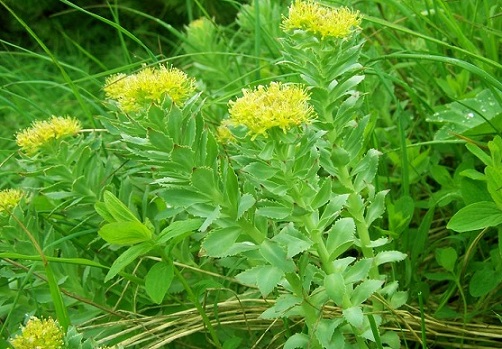Nikhil Prasad Fact checked by:Thailand Medical News Team Nov 13, 2024 5 months, 1 day, 13 hours, 51 minutes ago
Herbs And Phytochemicals: Salidroside, a compound derived from the traditional Chinese herb Rhodiola rosea, has shown potential benefits for those who suffer from cerebral ischemia, a condition often seen in stroke patients. A recent study from Xiyuan Hospital and Guangdong Pharmaceutical University in China has demonstrated how salidroside can support brain recovery by regulating certain pathways critical for cell survival and brain function. This
Herbs And Phytochemicals news report will explore these findings, highlighting the essential role of salidroside in reducing brain injury and improving cell health in stroke-related conditions.
 The Rhodiola rosea plant from which Salidroside is obtained.
Understanding Cerebral Ischemia and Salidroside’s Potential
The Rhodiola rosea plant from which Salidroside is obtained.
Understanding Cerebral Ischemia and Salidroside’s Potential
Cerebral ischemia, commonly resulting from blocked blood flow to the brain, often leads to significant damage due to lack of oxygen. This damage is particularly severe in cases of cytotoxic brain edema, where cells swell due to imbalances in electrolytes and water intake. The main active compound in Rhodiola rosea, salidroside, is known for its anti-inflammatory, anti-oxidative, and neuroprotective properties. While salidroside has been used in traditional Chinese medicine for centuries, researchers have only recently begun to explore its potential effects in neurological contexts.
Key Findings: Salidroside's Effects on Brain Injury and Cell Health
In their study, researchers found that administering salidroside to rats with induced cerebral ischemia produced several significant benefits. Using doses specifically measured and refined through previous research, salidroside treatment was linked to lower levels of brain swelling, reduced size of infarcts (dead tissue areas caused by lack of blood supply), and better overall neural function.
Salidroside’s effects were measured through various experiments:
-Neurological Function and Brain Water Content: Rats treated with salidroside scored lower in terms of neurological deficits and had reduced brain water content, indicating less swelling.
-Brain Infarct Size and Cell Health: The treatment also decreased the size of brain infarcts, suggesting that salidroside may help preserve brain tissue.
-Impact on Key Proteins: Salidroside influenced levels of key proteins related to glutamate metabolism, such as GS (glutamine synthetase) and GLT-1 (glutamate transporter 1), both of which help manage cell toxicity after ischemic injury.
Experimental Procedures and Observations
The study employed both in vivo (animal-based) and in vitro (cell-based) approaches to evaluate salidroside’s effects. Rats were divided into groups, with some receiving high doses of salidroside and others lower doses or no treatment. In cell experiments, human astrocyte cells (SVGp12 cells) were used to simulate cerebral ischemic cond
itions and examine how salidroside could impact their survival and function under stress.
Key observations from these experiments included:
-
Increased Cell Viability: Salidroside improved cell survival rates in SVGp12 cells subjected to glucose deprivation.
-Reduction of Glu Levels: Salidroside-treated rats showed decreased levels of glutamate (Glu), an excitatory neurotransmitter that can be toxic in excess.
-Enhanced Levels of Protective Enzymes: In treated rats, there was an increase in glutathione (GSH) levels, which serves as a natural antioxidant in cells, helping mitigate damage from free radicals produced during stress.
How Salidroside Interacts with Glutamate Pathways
The mechanism by which salidroside works involves its interaction with glutamate pathways. Glutamate is essential in transmitting signals between nerve cells, but during stroke or ischemia, its levels can rise dangerously, leading to cell death.
Salidroside supports the function of GS and GLT-1 proteins, which are responsible for regulating and metabolizing glutamate, thereby preventing toxic buildup. This modulation of glutamate pathways is crucial, as it suggests salidroside could act to protect brain cells by maintaining healthier glutamate levels. By facilitating the conversion of excess glutamate into less harmful substances and improving cell survival rates, salidroside holds promise as a therapeutic option for reducing the severity of ischemic brain injury.
Conclusions
The research underscores salidroside’s potential as a brain-protective agent, particularly in conditions involving cerebral ischemia. By enhancing the expression of key proteins and reducing harmful buildup of glutamate, salidroside shows promise in limiting brain cell damage and improving outcomes after stroke-related events.
In conclusion, this study provides evidence that salidroside’s regulation of glutamate and antioxidant pathways in astrocytes plays a significant role in reducing brain injury. As a result, salidroside could serve as a beneficial adjunct therapy for stroke patients, offering a potential natural solution for improving brain health.
The study findings were published in the peer-reviewed journal: Frontiers in Pharmacology.
https://www.frontiersin.org/journals/pharmacology/articles/10.3389/fphar.2024.1472100/full
For the latest on
Herbs And Phytochemicals, keep on logging to Thailand Medical News.
Read Also:
https://www.thailandmedical.news/news/herbs-and-phytochemicals-study-unveils-the-potential-of-total-saponins-from-trillium-tschonoskii-maxim-in-restoring-cognitive-function-after-stroke
https://www.thailandmedical.news/news/herbs-and-phytochemicals-oroxylum-indicum-extracts-boosts-brain-health-and-are-neuroprotective
